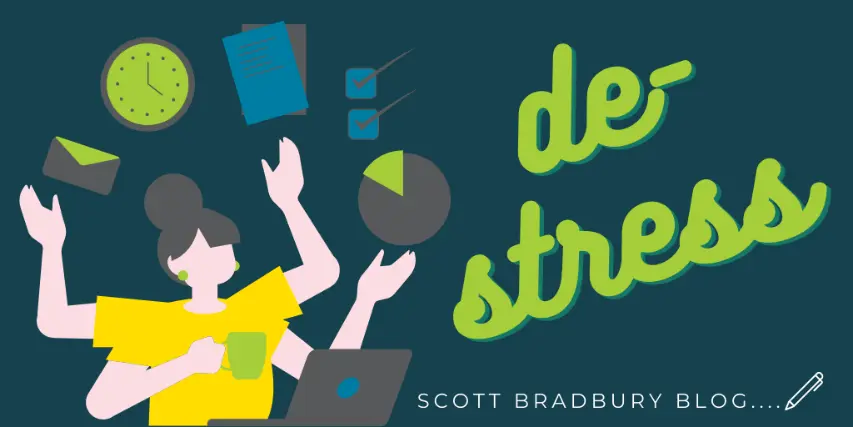
Try our DE-STRESS technique to help reduce distractions and deal with them in a way that won’t impact your frame of mind.
Disturb (do not)
Turn off notifications – be that your email, yammer feed, Teams, or mobile phone. That gentle ping that alerts you to an incoming message is one that is at times too tempting not to respond to. If notifications are silenced, you have the ability to solely focus on the task at hand. Schedule time to pick up notifications later in the day, that way you won’t get anxious about missing anything.
Explain to Others
Bear in mind that distractions that are happening around you aren’t going to go away. In the open plan office area, there will always be the too loud Zoom/Teams conference calls – where you can only hear one side of the conversation and your headphone wearing colleague is not able to comprehend the volume at which they are speaking. Politely explain to others that their behaviour is having an adverse impact on you. Work out compromises – for instance allocate ‘noisier time’ or ‘quiet time’ zones within the working day.
Signal your Intentions
You can reduce the number of interruptions by signalling to others that you aren’t available for a period of time but remember you can’t control other people’s actions. It could be as simple as using noise-cancelling headphones or actively telling colleagues not to interrupt you during a particular timeframe. If you are interrupted, politely advise that this is your ‘focus’ time and explain when you will be available so that the other person knows when you’ll be responding.
Take Regular Breaks
Taking regular breaks is vital. You will achieve more if you take a screen break. Whatever you do – be that make a cuppa, stand by the window, stretch your legs, get outside - ensure that you physically step away from the desk. Don’t use the break time to sit at your desk and respond to incoming emails, ensure that you physically move and get that much needed screen break time. It goes without saying, leave your mobile phone at the desk too – don’t replace the big screen with a smaller one! Stepping away will give you a fresh perspective and when you return to your desk will enable you to be more present.
Resolve
Don’t let distractions frustrate you. Resolve to ignore/block out the colleague that is speaking too loudly. If you are distracted, take the opportunity to stop what you are doing have a break and return to your task at a later time. Can you move elsewhere to do your work? Is there a dedicated quiet space? Or can you have a conversation with your colleague and suggest that they take their calls/have their conversations in a different area.
Expect interruptions
Plan and set realistic expectations. Start your day with a plan in mind of what you are going to achieve, but also plan ahead and think about how you are going to handle distractions. If you are interrupted by a colleague, pause what you are doing, reassure them that you are interested, and ask them to come back to you at a more appropriate time.
Super Concentrate
“Super concentrating” is a phrase we like to use at Scott Bradbury – and by that we mean keeping an intense focus for a period of time. Think about how you work, and if you are working on something that requires concentration, ensure that you really do focus on the task and block out any external distractions. If you are interrupted, think about how you can keep the last idea you had in mind. Is it as simple as having a jotter handy? Or is it easier to leave yourself a voice note, or can you use a digital note-taking device - assuming that this isn’t one that will have other distractions on of course. If you super concentrate during the focus time you have scheduled in your diary you will find that you will achieve more and will have time later in the day to deal with the distractions.
Schedule Focus Time
You know how you work best. In the late 1980s Francesco Cirillo developed the Pomodoro technique. He suggested splitting your working day into 25-minute focus periods followed by five-minute breaks. Repeating this process four times and then taking a longer break. You don’t have to be as prescriptive as this - you know how you work best and what your concentration span is. But the technique does make you focus in short bursts. So, think about how long you can focus for and set a timer. And, if you are allocating focus time, why not also allocate time for distractions – schedule in time so you can look at your social media channels, answer emails etc.
Whatever you are facing, try out the DE-STRESS technique to help reduce distractions and ensure that you deal appropriately with any disturbances that may come along to knock you off-track.
We have two WATCH & GO® videos, Dealing with Distractions and What To Say When a Colleague Wants to Chat which both offer further tips and techniques on how to deal with disturbances and interruptions. Contact us if you would like more information on how to access these and our other online digital resources.